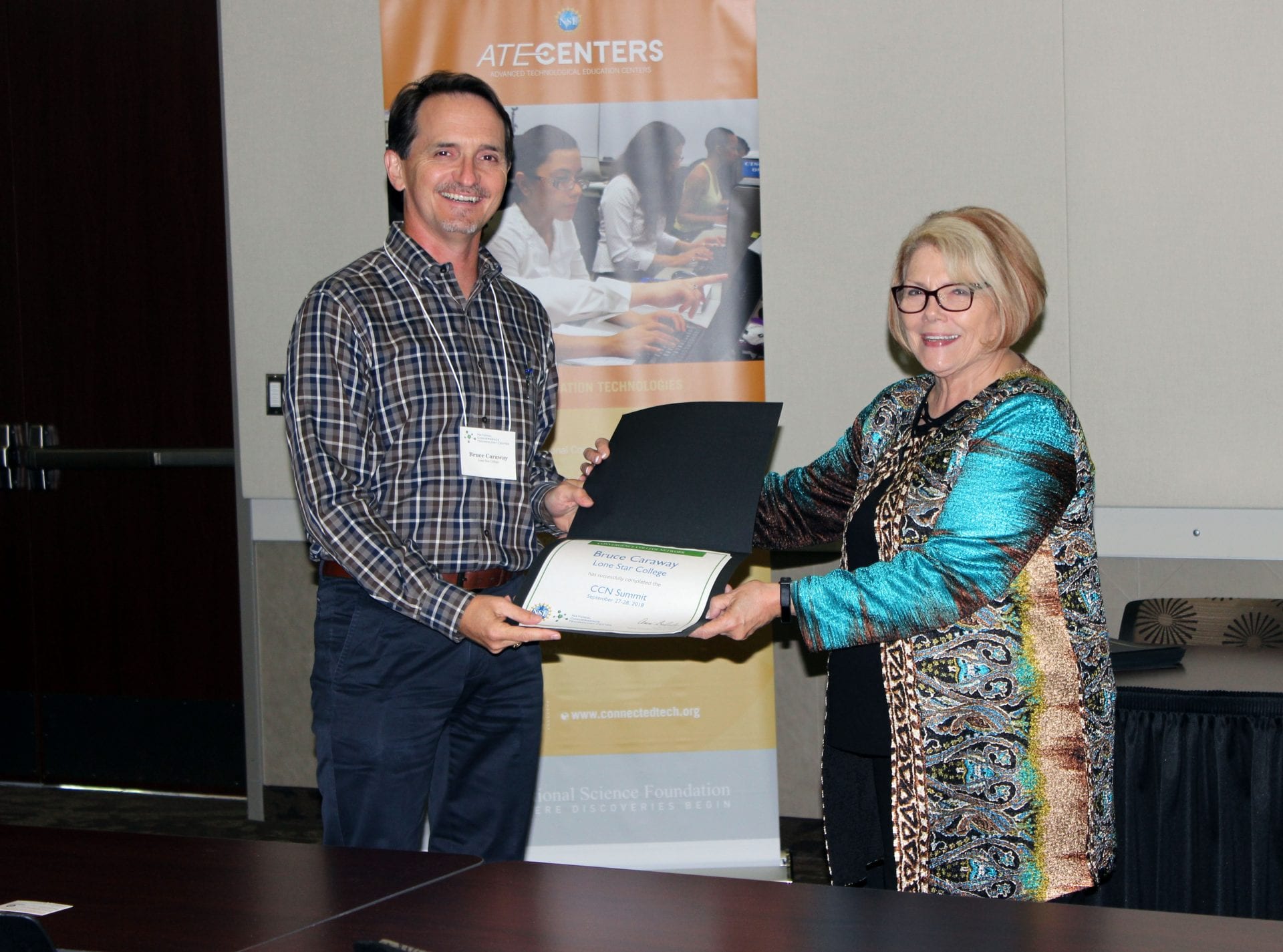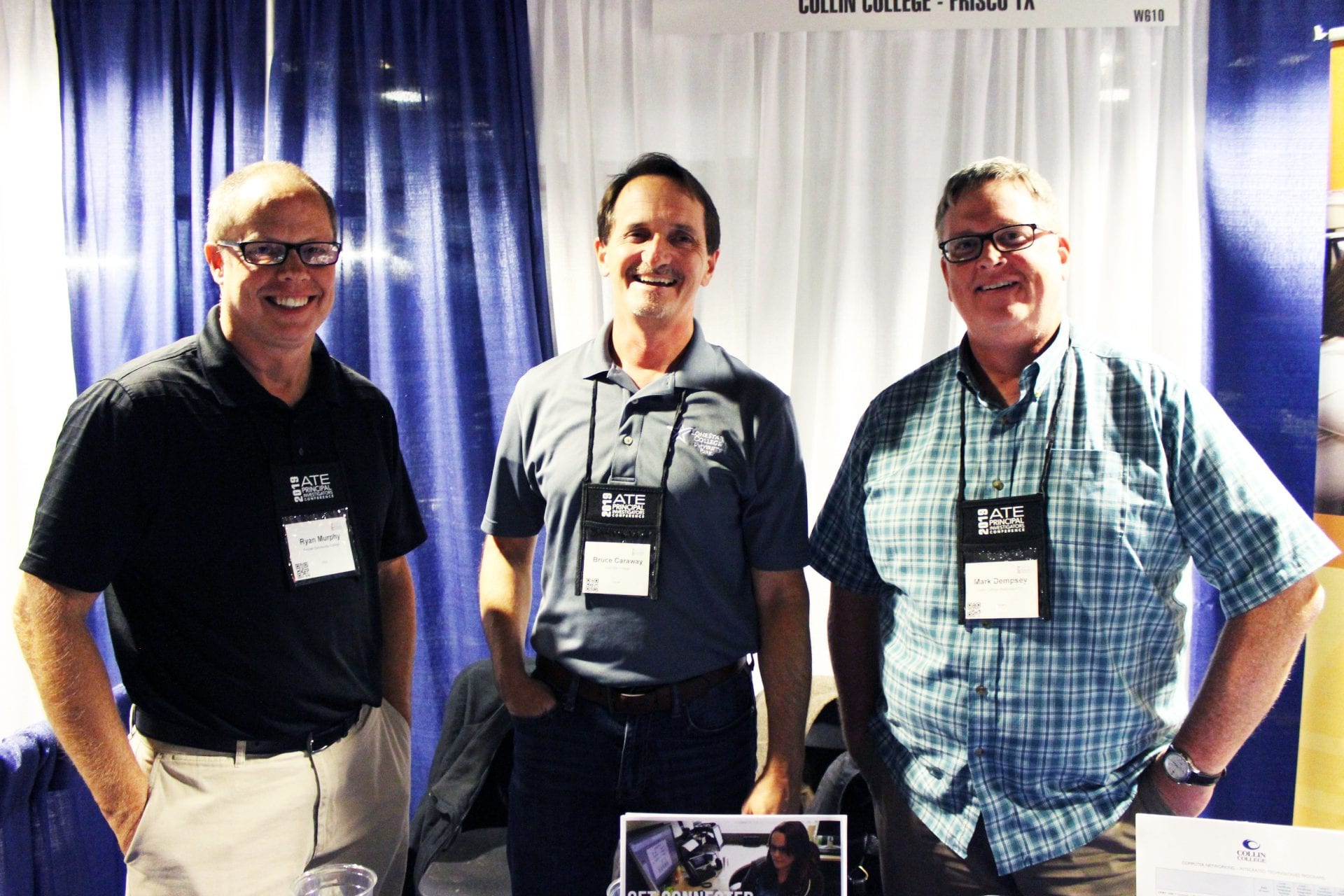Remembering Bruce Caraway…
In memory of the Convergence College Network’s (CCN) member, Bruce Caraway, who served as an assistant professor in the Computer Information Technology Department at Lone Star College (LSC), the National Convergence Technology Center would like to repost Bruce’s featured IT story. Bruce passed away earlier this year after a short illness. We will truly miss his presence at the CTC events and workshops. Our sincere condolences to his family. The interview below was originally posted in 2018.

Bruce pictured here with Dr. Ann Beheler of the National Convergence Technology Center at the 2018 CCN Summit.
The CCN is a select cohort of community colleges and universities from across the country that connects IT educators with a wealth of resources to enhance their programs.
What do you teach? I teach in the Computer Information Technology Department, specifically, a business application introductory course, Computer Programing with Python and also Web Design 1 and 2.
How long have you been a teacher, and what sparked your interest in teaching? I started teaching higher education in September 2011, after spending almost 20 years in corporate IT. I had always found myself leaning toward a mentoring role at least when I was on the corporate side and was also asked to do some corporate training from time to time. My role in the corporate world was not as much fun as it used to be because I was a little too gray (laugh) in the hairline. I had to do more managerial stuff; it wasn’t the cool stuff anymore. I started teaching in a continuing education role here at Lone Star initially and realized that there was an opportunity to teach nontraditional students and traditional freshman and sophomore level students. I love doing that and that was my inspiration to leave corporate IT. I went full-time in 2014.
What is the secret to successfully teaching IT to students? I think its practice, practice, practice. You can only lecture for so long, you have to get the students involved and explain to them that it’s okay to make mistakes especially when you understand how technology works. Those are usually your best lessons.

Bruce pictured here along with his IT partner Rajiv Malkan of Lone Star College at 2019 ATE conference.
You have to plan to work one on one with different students. It’s almost like when you’re a developer and you’re in a peer development setting where you work side by side with another developer. You may be a senior developer and working with a junior, the equivalence of being able to work with each other, both parties learn, whether that’s serving as a true developer or in the teaching realm. I think it’s a case where you know you’re not going to be up lecturing for 30 minutes or presenting a video. You will have to spend time in the trenches with the student, practicing with them and showing them; letting them sometimes show you things that you thought you understood, and you realize, “Oh, there is another way to do this.”
What’s the biggest challenge teaching IT? That’s kind of a loaded question. I’m looking at what I would consider my traditional freshman 1st and 2nd year students, and many are not coming in with a lot of technical background though we assume they do. Their experience is fairly shallow. A lot of them haven’t spent that much time on a traditional computer, everything they do is on a handheld device. Sometimes, breaking down the expectations both from the student who is maybe afraid to tackle the bigger hardware to actually opening up a text editor and writing code. But I think there’s also the challenge of the administrators and staff of the institution, who may think, “Why do we have to teach these students anything. They already know it all, their technically savvy.” I think that’s definitely a misunderstanding that works against us sometimes.
Have you always been a teacher? And if you had a job in the “real world” prior to teaching, what was it? My title was usually a technical manager, whether that was a development manager or team manager.
How has the CCN helped you? Well, if you take that last letter in CCN, Networking – the exposure that I’ve had with so many people, both directly in Collin County and also among the entire network, I think has certainly helped me learn how to deliver content and how to teach technology. In attending the Working Connections, I’ve certainly drawn a lot of observable knowledge from seeing others teach technology. And the sharing of ideas is invaluable.

Bruce pictured here at the National CTC’s booth for 2019 ATE conference with Ryan Murphy of Sinclair College (left) and Mark Dempsey (right).
What is the best thing about being a part of CCN? Extended network of peers and good friends.
What advice would you give a new community college joining CCN? Take advantage of all the resources that are available. Participate in the calls; attend the working connections every opportunity you’re given. Also, make sure you share the information you have learned with your peers within your institution and give them a chance to come and find out about it too.
Is there anything you would like to suggest improving the CCN program? I think it was mentioned during the CTC Leadership meeting about expanding the usage of the blog. Maybe if we push through on that and task not just the immediate staff at Collin College but to leverage those of us in the network to help build that content.
How do you see the IT landscape changing in the next 5 years? Where IT has been sectioned off in the past as a department – Computer Technology or Computer Science – those hard boundaries are melting away in the field of technology. A lot of it is being driven by what we’re seeing in the data realm. The analytics and Big Data, Data Science, those things are becoming so much more prevalent to other disciplines whether it’s science or medicine. Every discipline you find it seems they need to know more about how to handle all the data they have. I think what our challenge is or what we need to be cognizant of is as we move five years, ten years down the road, we really need to reach across the barrier and work with our peers and those other disciplines, those other rubrics. One of the challenges we have, right now, is that sometimes our institutions are resistant to expand our programs because we are teaching students that are already technically savvy. As our affiliate faculty members are recognizing the need, we need to be ready to jump across and help, and I don’t know if that means we’re going to get new courses on our side to leverage those new programs that are cross discipline, all is possible, but I think we need to be ready to offer our services as they start to recognize.
